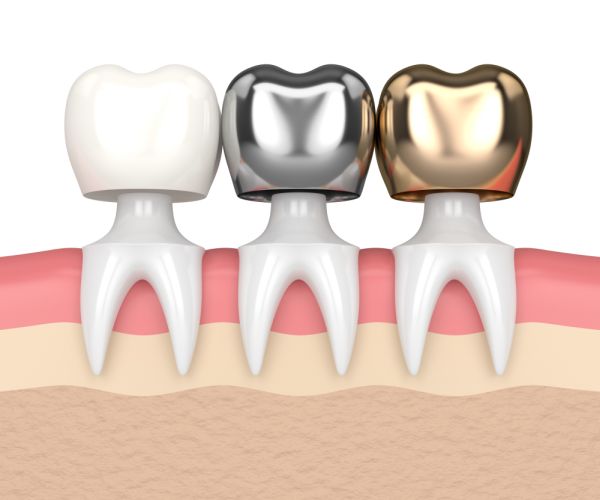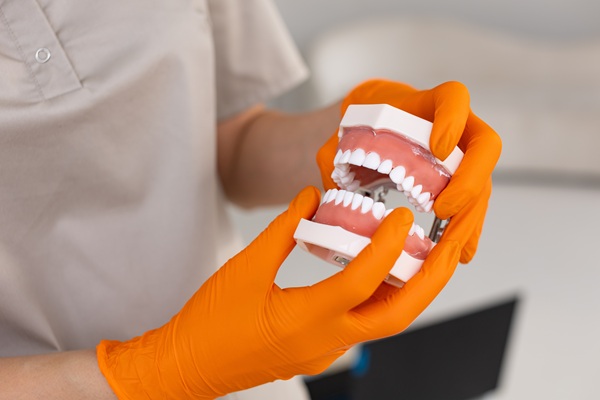How Does a Dental Crown Protect Your Tooth?

A dental crown can be used to fix a wide range of dental issues. Also called caps, these are tooth-like shells that are used to encase an entire tooth. It serves multiple functions: protecting the tooth from further decay and restoring its appearance.
Issues that crowns are often used to fix:
- Chipped, broken or cracked teeth
- Badly discolored teeth
- Severely decayed teeth
- Infected teeth
- Short teeth
- Gaps between teeth
How a dental crown protects a tooth
Here are ways that a crown protects the wearer's tooth from further damage:
1. It keeps away things that can damage the tooth
A dental crown protects teeth by keeping them safe from all the irritants in the mouth. Saliva, bacteria, food particles and acids are responsible for most of the dental issues people develop. Since the crown fully encases the tooth, these substances cannot reach the affected tooth to cause more damage.
For example, acids in the mouth are responsible for the vast majority of tooth decay. Some of these acids get into the mouth via the things a person eats, while others are produced by oral bacteria. These acids eat away at the protective outer layer of tooth (enamel), leaving the more sensitive parts of a tooth exposed.
2. It reinforces the tooth and protects it from bite forces
A crown also protects one's teeth from the forces involved in chewing. This is particularly important if the tooth has already been damaged. A crown restores the structural integrity and function of the tooth, allowing the patient to chew and speak with the damaged tooth as they have always done.
3. It holds the tooth together
When a tooth is protected with a cap, any fragmented parts of the tooth are held in place by the crown. This prevents the tooth from breaking into small pieces over time. It makes dental crowns an effective way to fix teeth that have fragmented into multiple pieces.
What to expect when getting a crown
There is not much to getting a dental crown. It starts with an evaluation, during which the dentist examines the patient and their oral issues. If the dentist determines a crown is the best solution, the patient's tooth will be prepared. This might involve removing a portion of enamel to make sure the crown holds tightly onto the remainder of the tooth.
An impression of the patient's mouth is taken, and this is sent to a dental lab that makes crowns. It takes about two weeks for the prosthetic to be ready. The dentist will usually fit the patient with a temporary crown and send them on their way.
Once the crown is ready, the patient is called back for an appointment, during which the temporary crown is taken out and the permanent one installed.
Need a crown?
Stop by our Irvine office if you are dealing with a dental problem that requires the use of a crown.
Request an appointment here: https://www.lightbreezedental.com or call Light Breeze Dental at (949) 274-4719 for an appointment in our Irvine office.
Check out what others are saying about our services on Yelp: Read our Yelp reviews.
Recent Posts
Dental professionals recommend a denture reline at least every two years. However, you might need to get your dentures relined more often depending on various factors, such as the materials used for the reline and the degree of bone loss you have experienced. You need to visit a general dentist once a year to get…
Oral injuries that lead to severe bleeding in the mouth count as dental emergencies. Blood clots have a more challenging time forming in the mouth, and deep cuts in the mouth can lead to significant blood loss without the care of an emergency dentist. Waiting up to a few weeks for a regular appointment is…
A dental veneer is a popular cosmetic dentistry solution designed to enhance the appearance of teeth by improving their shape, color, and alignment. Proper care and maintenance are essential to maintain a dental veneer's longevity and aesthetic appeal. Following a few practical steps, patients can ensure their veneers remain durable and beautiful for years.Good oral…
A damaged dental crown can cause discomfort and disrupt the functionality of your teeth. Whether the crown has cracked, chipped, or fallen out, addressing the issue promptly is crucial for preserving your oral health. Dental crowns are designed to protect and restore damaged teeth, but taking the right steps can prevent further complications when they…


